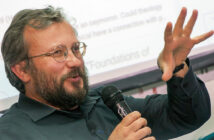Source: Public Orthodoxy
Tiffany Butler
Ph.D. Candidate, University of Edinburgh
In an interview reported by The Russian Orthodox Church Department for External Church Relations, Rossiya TV asked Patriarch Kirill about his visit to Latin America in February 2016. At the time, Kirill commented about his impression of South America and his hopes for that country. As a comparative lesson, he reflected on the experience of the Soviet Union under a single monopoly in pursuit of one goal of development. He suggested that Latin America is at a similar crossroads between secular and religious influences. In 2016, Kirill responded, Russia seeks to integrate the experience of the church into its development. He is quoted as saying, “Today we are trying to build—not without difficulties or criticism—a society where religious faith could harmoniously coexist with education, technology, information, and modern lifestyle. And the task of the Church in Russia is to support this synthesis of things spiritual and material.” In light of this shift, Kirill offers to Latin America what he believes modern Russia learned during the Soviet Union. That is, he warns that no country can “achieve such goals without God, just as it proved impossible to build the Tower of Babel.” Patriarch Kirill’s reference to the Tower of Babel deserves critical examination in light of Russia’s aggression in Ukraine.
According to Genesis 11, the inhabitants of Shinar in Babylon set out to build a great tower. Their common purpose? They say to one another, “Come, let us build ourselves a city, and a tower whose top is in the heavens; let us make a name for ourselves, lest we be scattered abroad over the face of the whole earth” (v 4). Yet, their actions contradicted God’s earlier instruction that Noah and his descendants “Be fruitful and multiply, and fill the earth” (Gen 9:1b).
Up to this point, we read that the world had “one language and one speech” (Gen 11:1). The Hebrew words in the text tell the builder’s aims. In this context, “language” carries a connotation of a nation with specific borders, and “speech” is akin to a common mind in community matters and affairs. What is further interesting is the epistemology of the word “babel.” It comes from an Akkadian word meaning “the gate of God.” For those building the Tower, if the Akkadian interpretation indicates their goals, it does not appear that the builders, themselves, believed they were achieving their goals without God. Only the Hebrew play on babel, balal, indicates how the Lord “confused” the language (v 9) and reveals any inference of folly or counterfeit intentions.
Today, the Orthodox Church exists in almost every territory in the world. No doubt, geographical distance, language, and culture make communication with one another very difficult and often frustrating, to say the least. But if the Tower of Babel account teaches us anything, dispersion and difference in language and culture are, somehow, meant to bring us closer to God’s purposes. At the very least, God’s blessings should not be pooled in a solitary border or territory.
I believe one contemporary application of this account is that people need to come into one another’s space and language to experience the collective blessings of God. This movement takes extreme humility, time, and many questions. Such action means no single “language,” that is, no one border or nation, is “the gate of God.” The dispersion of Noah’s descendants, no doubt, would destabilize all that was known and comfortable, but it presented an opportunity for many nations in communion. In this space, I believe the Russian Orthodox idea of sobornost presents a critique of the Moscow Patriarchate’s support of Putin’s war in Ukraine as well as offers a unique opportunity.
During the Reunion movement to bring together the Byzantine emperors and as an affront to the Papacy, the word sobornouu appeared in a late medieval Slavonic version of the Nicene-Constantinople Creed and means “gathering together,” as opposed to kafolitcheskoou, which is often understood as “spread through the whole world” (Nichols, 1989). The idea of sobornost was developed further among the Slavophiles, particularly Aleksei Khomiakov, and it is captured in Paul Gavrilyuk’s distillation: “Church unity based on freedom and love, rather than external authority” (2014). There are three main interpretational strains of sobornost: sobornost-catholicity, sobornost-conciliarity, and sobornost-fellowship (Valliere, 2016). While all three constitute a whole picture, I believe further reflection on sobornost-conciliarity and sobornost-fellowship is necessary for public Orthodoxy. These two emphasize the “how” over the “what.”
In the development of Khomiakov’s engagement with sobornost, Paul Valliere notes the “sin of the Western schism for Khomiakov lies not in what the Western church did but in how it did it, by acting unilaterally rather than in fellowship, by executive decision rather than by consensus” (2016). Therefore, a “gathering together” implicit in sobornost may seem counterproductive with the example of the Tower of Babel, but it is pertinent in discussions of a process or the spirit, if you will, of how Christians are connected and interact amidst being scattered throughout the whole world. This consideration necessitates a way of interacting in conciliarity and fellowship. But there is one approach that will never be tenable and that immediately disqualifies an unrepentant person or leader: the shedding of blood.
After God’s initial instruction for Noah and his descendants to “Be fruitful and multiply, and fill the earth,” God adds a proviso in the manner, the how, in which people would move into the world: “Whoever sheds man’s blood, by man his blood shall be shed; for in the image of God he made man. And as for you, be fruitful and multiply; bring forth abundantly in the earth and multiply in it” (Genesis 9:6-7).
To build a society or seek to retain historical borders and interests through shedding blood, and claiming to achieve these goals with God, is folly. War and divisions continue to reveal the desire of political entities and nations to build a “gate of God,” but only confusion ensues. I believe Orthodox churches must continue the discussion around sobornost as conciliarity and sobornost as fellowship. Such a conversation is critically important in how Orthodox churches approach one another. The “how” is never through bloodshed but to restore and strengthen avenues of freedom, love, and blessing beyond borders and boundaries.




